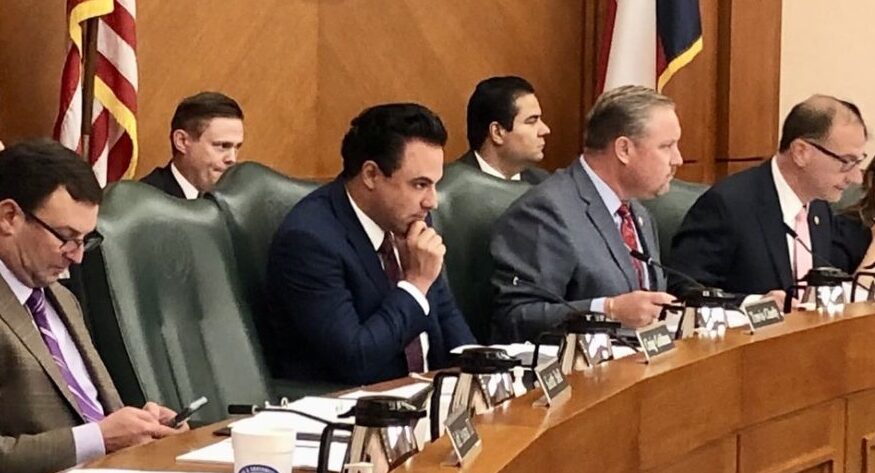UT Law School would offer distance-learning in the RGV for first-year law UT students under bill pre-filed by Rep. Terry Canales

In photo above, from left: The 10-member Texas Sunset Advisory Commission, meeting at the Texas Capitol on Thursday, November 10, 2022, include in this image Sen. Charles Perry, R-Lubbock; Rep. Justin Holland, R-Heath; Rep. Terry Canales, D-Edinburg; and Sen. Charles Schwertner, MD, R-Georgetown, Chair. The mission statement of this legislative body, which includes five senators and five state representatives, is to enhance government accountability to the Legislature and people of Texas by objectively evaluating the need for and value of state programs and services. Photograph Courtesy REP. TERRY CANALES
by DAVID A. DÍAZ | Nov 16, 2022
The University of Texas School of Law would be required to offer a distance-learning program in the Rio Grande Valley for first-year law students under legislation prefiled on Monday, November 14, 2022 by Rep. Terry Canales, D-Edinburg.
Prefiling is the term given to bills and other proposed legislation introduced into the Texas Legislature before the beginning of a legislative regular session. The first day for lawmakers to prefile legislation was Monday, November 14, 2022.
The measure – House Bill 116 by Canales, who is an attorney – would require a minimum of five, first-year law students in the Valley per academic year to be enrolled, but there is no limit on the number of such students.
For the second and third years of law school, those first-year UT law school students living in the Valley would have to transfer to Austin.
In general, a distance-learning program – also called remote learning – is a method of studying in which lectures are broadcast or classes are conducted by correspondence or over the Internet, without the student needing to attend in person a school or college.
If Canales’ House Bill 116 becomes state law, the University of Texas Law School would become the first public law school in Texas to provide distance learning.
St. Mary’s University School of Law in San Antonio and South Texas College of Law in Houston – both private law schools – provide distance learning programs.
If passed by the Texas Legislature by Monday, May 30, 2023, and not vetoed (opposed) by Gov. Greg Abbott soon thereafter, House Bill 116 would require the UT System Board of Regents to develop the remote-learning program.
The 88th Texas Legislature begins its 140-day regular session on Tuesday, January 11, 2023 and ends on Monday, May 29, 2023.
The UT System Board of Regents – which includes Nolan Pérez, MD of Harlingen – would be required to begin the distance-learning program not later than the Fall 2024 semester.
Canales’ House Bill 116 represents the third time the Edinburg-based attorney has made the identical proposal.
In 2019 and 2021, he proposed the same measure, but it never received a legislative committee hearing in the House of Representatives.
Instead, Canales and the six other members of the Rio Grande Valley state representative delegation threw their support for House Bill 695 by Rep. Armando “Mando” Martínez, D-Weslaco.
Martínez’ House Bill 695 – which was approved by the House of Representatives in 2019 and 2021 but was never given a committee hearing in the Senate – would have allowed any of the public university systems in Texas to create the law school.
According to an estimate provided in 2021 by the University of Texas System – Martínez’ law school plan may have featured a $63.8 million facility, and would have had at least 100 students enrolled in the first year.
In 2021, Martinez’ House Bill 695 was approved by the House of Representatives by a vote of 97 yeas, 47 nays, and 1 present not voting
Thousands of bills will ultimately be proposed throughout the legislative session.
His other legislative measures prefiled on Monday, November 14, 2022 also included:
House Bill 332, which would create a Cost-of-Living Adjustment (COLA) from the Teacher Retirement System of Texas (TRS) for Texas retired teachers. There are 450,000-plus current retires in the Teacher Retirement System of Texas.
Earlier this year, Canales called for a meaningful COLA for Texas school employees. Texas teacher retirement benefits were recently ranked 49th in the country by a bipartisan, nonprofit group focused on pension plans.
Canales also filed House Joint Resolution 5, which would constitutionally set a minimum amount that the state must contribute to TRS and the Employees Retirement System of Texas. In the past, the legislature has often balanced the state’s budget by slashing investments in Texas’ retired state employees.
“We cannot hope to recruit and keep our best teachers, unless we ensure a suitable retirement”, said Canales. “Investing in these school employees, is investing in our children.”
Retired Texas teachers have not received a cost-of-living adjustment since 2004, meaning they have lost 38 percent of the value of their benefits to inflation over these 18 years.
“In 2019 and 2021, the Texas Legislature provided a 13th monthly check to retirees, but these payments were not nearly enough to make up for the loss of benefits over the past two decades,” he said. “We must ask ourselves, if we don’t support our retired teachers, what does that say about our support for students and the overall Texas education system?”
Canales also filed the following bills:
• House Bill 71: would direct the Texas Department of Public Safety to create a digital Texas Driver License;
• House Bill 127: would bring the penalty for marijuana concentrates in line with marijuana; and
• House Bill 164: would create a sales tax exemption for college textbooks.

